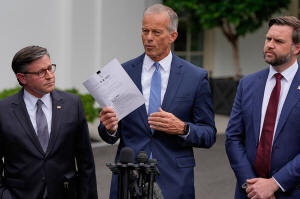US government on brink of first shutdown in almost seven years amid
partisan standoff in Congress
[September 30, 2025]
By MARY CLARE JALONICK, LISA MASCARO and STEPHEN GROVES
WASHINGTON (AP) — A partisan standoff over heath care and spending is
threatening to trigger the first U.S. government shutdown in almost
seven years, with Democrats and Republicans in Congress unable to find
agreement even as thousands of federal workers stand to be furloughed or
permanently laid off.
The government will shut down at 12:01 a.m. Wednesday if the Senate does
not pass a House measure that would extend federal funding for seven
weeks while lawmakers finish their work on annual spending bills. Senate
Democrats say they won’t vote for it unless Republicans include an
extension of expiring health care benefits, among other demands, while
President Donald Trump and Republicans are refusing to negotiate at all,
arguing that it is a stripped down, “clean” bill that should be
noncontroversial.
It was unclear, so far, if either side would blink before the deadline.
“It’s now in the president’s hands,” Senate Democratic leader Chuck
Schumer said Monday after a meeting with Trump at the White House that
yielded little apparent progress. “He can avoid the shutdown if he gets
the Republican leaders to go along with what we want.”
Vice President JD Vance, who was also in the meeting, said afterward, “I
think we’re headed into a shutdown, because the Democrats won’t do the
right thing.”
While partisan stalemates over government spending are a frequent
occurrence in Washington, the current impasse comes as Democrats see a
rare opportunity to use their leverage to achieve policy goals and as
their base voters are spoiling for a fight with Trump. Republicans who
hold a 53-47 majority in the Senate will likely need at least eight
votes from Democrats to end a filibuster and pass the bill with 60
votes, since Republican Sen. Rand Paul of Kentucky is expected to vote
against it.

No agreement at the White House
Trump had shown little interest in entertaining Democrats’ demands on
health care, even as he agreed to hold a sit-down meeting Monday with
Schumer, Senate Majority Leader John Thune, R-S.D., House Speaker Mike
Johnson, R-La., and House Democratic leader Hakeem Jeffries, D-N.Y.
As he headed into the meeting, Trump made it clear he had no intention
to negotiate on Democrats’ current terms.
“Their ideas are not very good ones,” Trump said.
It was Trump’s first meeting with all four leaders in Congress since
retaking the White House for his second term, and he did more listening
than talking, Jeffries told House Democrats at the Capitol afterward,
according to a lawmaker who attended the private caucus meeting and
requested anonymity to discuss it.
Schumer said after the closed-door meeting that they had “had candid,
frank discussions” with Trump about health care. Vance also said Trump
found several points of agreement on policy ideas.
Schumer said Trump “was not aware” of the potential for health insurance
costs to skyrocket once the subsidies end Dec. 31.
But Trump did not appear to be ready for serious negotiations. Hours
later, Trump posted a fake video of Schumer and Jeffries taken from
footage of their real press conference outside of the White House after
the meeting. In the altered video, a voiceover that sounds like
Schumer’s voice makes fun of Democrats and Jeffries stands beside him
with a cartoon sombrero and mustache. Mexican music plays in the
background.
Jeffries posted in response that “Bigotry will get you nowhere.”
He added, “We are NOT backing down.”

[to top of second column]
|

Senate Majority Leader John Thune, R-S.D., talks to reporters
outside the West Wing of the White House, Monday, Sept. 29, 2025, in
Washington, as House Speaker Mike Johnson of La., and Vice President
JD Vance, listen. (AP Photo/Alex Brandon)

Expiring health care subsidies
Democrats are pushing for an extension to Affordable Care Act tax
credits that have boosted health insurance subsidies for millions of
people since the COVID-19 pandemic. The credits, which are designed
to expand coverage for low- and middle-income people, are set to
expire at the end of the year.
“We are not going to support a partisan Republican spending bill
that continues to gut the health care of everyday Americans,"
Jeffries said.
Thune has pressed Democrats to vote for the funding bill and take up
the debate on tax credits later. Some Republicans are open to
extending the tax credits, but they want to place new limits on
them.
“We’re willing to sit down and work with them on some of the issues
they want to talk about,” Thune told reporters at the White House,
adding, “But as of right now, this is a hijacking of the American
people, and it’s the American people who are going to pay the
price.”
A crucial, and unusual, vote for Democrats
Democrats are in an uncomfortable position for a party that has long
denounced shutdowns as pointless and destructive, and it's unclear
how or when it would end. But party activists and voters have argued
that Democrats need to do something to stand up to Trump.
Some groups called for Schumer’s resignation in March after he and
nine other Democrats voted to break a filibuster and allow a
Republican-led funding bill to advance to a final vote.
Schumer said he voted to keep the government open because a shutdown
would have made things worse as Trump’s administration was slashing
government jobs. He says things have changed since then, including
the passage of the massive GOP tax cut bill this summer that reduced
Medicaid.
Some of the Democrats who voted with Schumer in March to keep the
government open were still holding out hope for a compromise.
Michigan Sen. Gary Peters said Monday that there is still time
before the early Wednesday deadline.
“A lot can happen in this place in a short period of time,” Peters
said.
Shutdown preparations begin
Federal agencies were sending out contingency plans if funding
lapses, including details on what offices would stay open and which
employees would be furloughed. In its instructions to agencies, the
White House has suggested that a shutdown could lead to broad
layoffs across the government.

Russ Vought, Trump’s budget director, told reporters at the White
House that a shutdown would be managed “appropriately, but it is
something that can all be avoided” if Senate Democrats accepted the
House-passed bill.
Before joining the administration, Vought had advised hardline
conservatives in Congress to use the prospect of a shutdown to
negotiate for policy concessions. But on Monday, he berated
Democrats for engaging in a similar ploy.
“This is hostage taking. It is not something that we are going to
accept,” he said.
___
Associated Press writers Seung Min Kim, Kevin Freking and Joey
Cappelletti in Washington contributed to this report.
All contents © copyright 2025 Associated Press. All rights reserved |